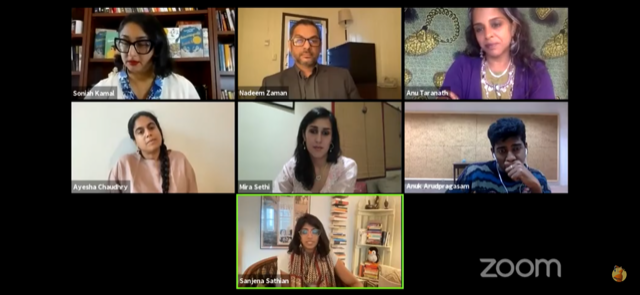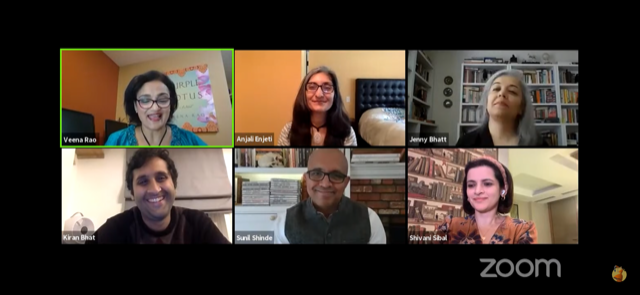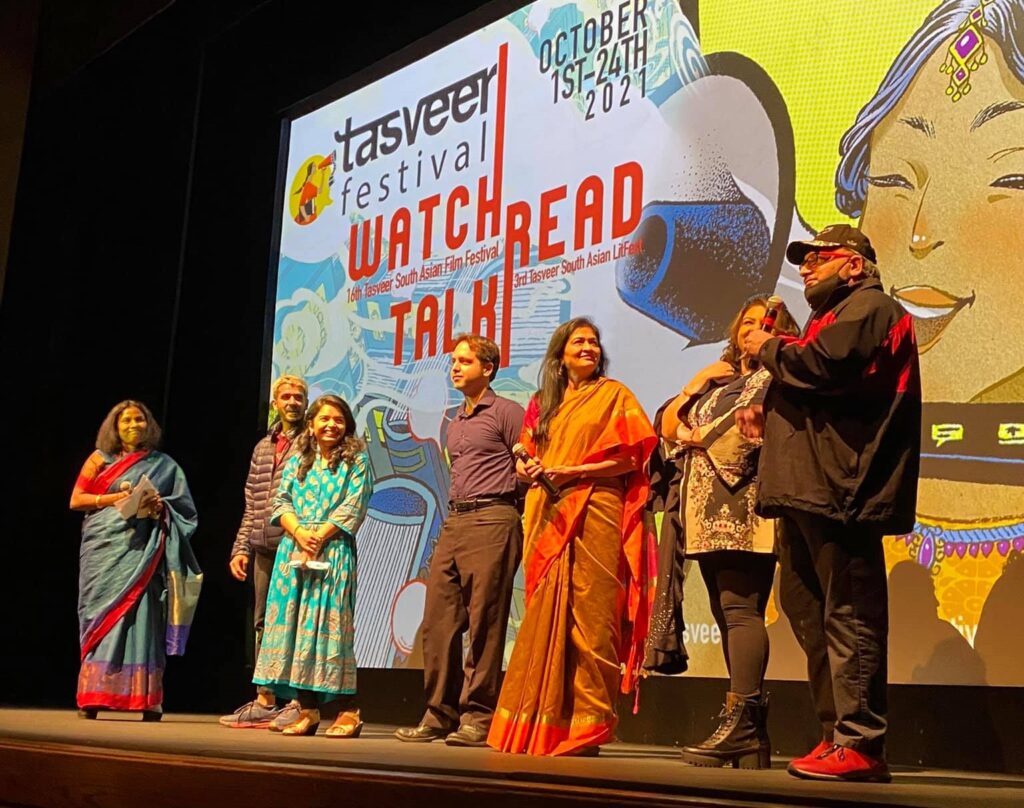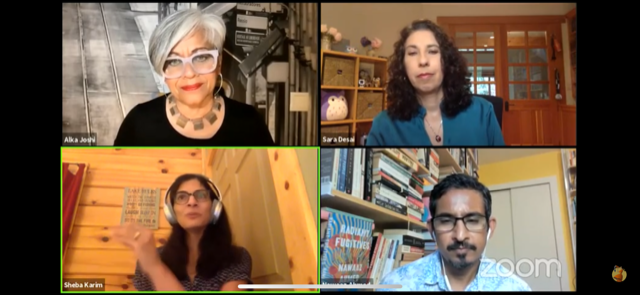BY JYOTHSNA HEGDE
Seattle, WA, November 17, 2021: Amplifying under-represented South Asian voices and spotlighting South Asian writers, the third annual Tasveer South Asian Litfest (TSAL) 2021, a virtual event, brought together, an eclectic group of writers, poets, novelists, screenwriters, and diverse programs with engaging dialogues focused on South Asian stories regarding representation, equity, climate change, LGBTQ issues, women’s rights, and much more between October 1 – 24, 2021.
In its 16th year, Tasveer Festival highlighted three themes “Watch | Read | Talk “ that combined the 16th Tasveer South Asian Film Festival (TSAFF), 3rd Tasveer South Asian LitFest (TSAL), and a new platform including comedy workshops and South Asian pride narratives through the Desi Girl Comedy Project + Coming Out stories.

“In the midst of the ongoing pandemic, TSAL 2021 represented the resourcefulness and dedication that defines what makes Tasveer a success. A combination of technology – Zoom, Elevent, Slack, WhatsApp, FaceTime, and YouTube – and the tireless behind-the-scenes work of Tasveer staff and volunteers scattered across the world – Seattle, Atlanta, New York, Delhi, and Morocco – came together to produce the fully-online Tasveer’s 3rd Lockdown Litfest TSAL 2021 offering greater accessibility to book lovers worldwide,” stated Alka Kurian, Director, TSAL and Member, Tasveer Board.
Across ten panels, and a range of genres – novels, short stories, poems, and non-fiction, the festival had something to offer for everyone, including issues of gender, immigration, history, poetry, LGBTQ lives, YA, issues of space, craft, and mood, publishing, and more. The stellar author lineup included Booker Prize nominees Avni Doshi and Anuk Arudpragasam, Commonwealth Prize winner Tahmima Anam, along with Atlanta’s Women’s Fiction awardee, Veena Rao. Notable Atlanta based author participants at the Litfest included Soniah Kamal, Award winning novelist, essayist and public speaker, Kiran Bhat (Atlanta born), polyglot, novelist, short-story writer, educator, and traveler and Anjali Enjeti, former attorney, organizer, and award-winning journalist.
Authors and moderators from Afghanistan, Bangladesh, India, Pakistan, Sri Lanka, and the diasporas engaged in animated discussions as they tried to make sense of the ways in which race, class, caste, religion, gender, and sexuality shape the lives of people – as individuals or members of communities across immediate and wider geographical borders. The audience had the freedom to join the sessions live or by means of their recordings.

Much like the way Indian restaurants in the US and elsewhere westernize ethnic food to make it more palatable to their Western eaters, even as we witness an emerging era of South Asian writers and characters, for the most part, what the publishing industry has decided is best for Western readers is pandering, cliché-heavy, creamy Malai-Kofta fiction that is easy to digest and doesn’t contain too many “strange, foreign” ingredients. In this context, the role of festivals such as TSAL play an important role in highlighting the indigenous cultures and voices.
“When TSAL director Alka Kurian invited me to be part of the literary festival program committee in April, I was immediately drawn to Tasveer’s mission of amplifying underrepresented South Asian voices in literature and film. As an author who has struggled to find representation in a whitewashed industry; where even voices of color are interpreted through a white lens– I believe Tasveer’s work is meaningful and important,” observes Rao. Rao is keen to return. “I was fortunate to be part of a wonderful team led by Alka and Tasveer co-founder Rita Meher and play a small part in empowering South Asian literary voices. I look forward to working with the team again next year!”
Kamal, who was born in Pakistan, grew up in England and Saudi Arabia, and lived all over the US and currently in Georgia, relates to the issue all too well. “Tasveer is a beautiful opportunity to explore and immerse oneself in what it means to be a South Asian community via arts and culture. I absolutely loved the panels where novelists, actors, film makers, literary agents, screenwriters etc.. from all countries came together to talk about similarity of experiences but also the differences. My experience as a Pakistani diaspora novelist has been realizing, and painfully coming to terms with, why my work is not ‘right for our list’ according to the US publishing world and so how very refreshing to hear literary agents Anjali Singh and Ayesha Pande’s candid panel about this very topic. The panels, the discussions, the films, everything Tasveer Festival offers is so necessary to diaspora communities it is the ideal place, vibrant and vital, for Desi families who may still have reservations when their children join the arts fields. Such a pleasure to be part of Tasveer.”

Polyglot, Global Citizen who has traveled 135 countries, Bhat agrees. “Our culture gets very little attention in both India and the USA, and so it feels like a real step ahead to see so many people of my background – and almost exclusively of my background – speak up. I remember seeing a picture of all the novels being profiled and I was smiling at delight, seeing so many upcoming South Asian American friends having their books covered. I hope these spaces and their foundation will help in diversifying the space that our community can play on the global stage, and for many generations to come.”
Panelists and Moderators opened up engaging and intriguing discussions treading through a range of themes and topics in the writing arena, that included Space, Place, Craft, Setting and Mood, Navigating Contested Gender Terrains, What We Talk About When We Talk About Us, Curious Imaginings, South Asian Stories and Publishing, From the Author’s Lens: Getting Published In the US, Shapes of History, Poetic Imagination Empowering Thoughts, Discordant Love: Queer Narratives.
“I learned a lot and was especially humbled and moved by the conversations about the positionality of “Muslimness” in India, as discussed by Farah and Hussain. It left me with a great deal of food for thought,” noted Ayesha S. Choudhury, Symposium panelist

Shook by the “Go back to your country,” rhetoric
literally yelled out at her, Rita Meher, Executive Director, co-founded Tasveer
in the aftermath of 9/11 to create a
platform for the underrepresented South Asians to elevate their stories with a
mission is to inspire social change through thought-provoking South Asian
films, art, and storytelling. “I believe that our stories should be told by us,
and not others, and increase our representation in the media.
“I think it is very important to support festivals such as Tasveer
that provides a thought-provoking platform to showcase South Asian talent in
the fields of filmmaking, direction, acting, writing, literature, and also
addresses social issues. It gives me and my wife (Madhu Sheth )
immense pleasure to encourage and support festivals that are rooted in the rich
South Asian heritage and culture,” noted Dr. Jag Sheth, of Sheth Foundation, one
of the sponsors of the event.
“Literature is a textually transmitted disease, normally contracted in childhood,
“Jane Yolen famously quoted. And some of the best pieces of literature that
draws in its readers, be it a child or an adult, are those that are authentic,
such as the simple Malgudi Days by R. K. Narayan or the Russian epic The
Brothers Karamazov by Dostoevsky. Hopefully in the years to come,
publishers will allow walls they have erected around the South Asian genre to
become more permeable to literature that isn’t all exotic and encourage writers
to take risks with focus on presenting a subcontinent and its culture the way
it is, rather than worry about making readers uncomfortable. Literary Festivals
such as Tasveer serve as facilitators of the process, igniting interest, issues
innovation and intrigue.
More Veg Korma, please. And DON”T hold that spice!
All virtual film and literary panels are available on Tasveer’s YouTube channel: Tasveer – YouTube.





